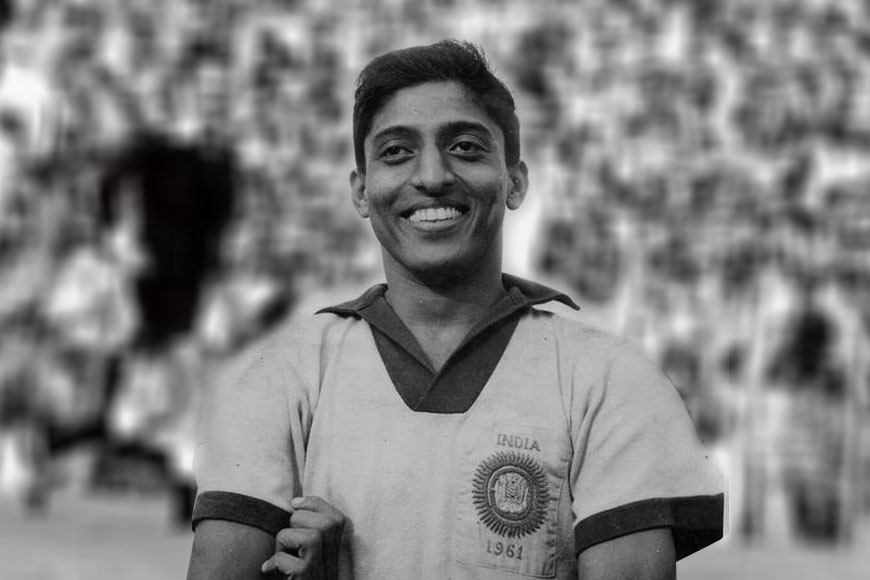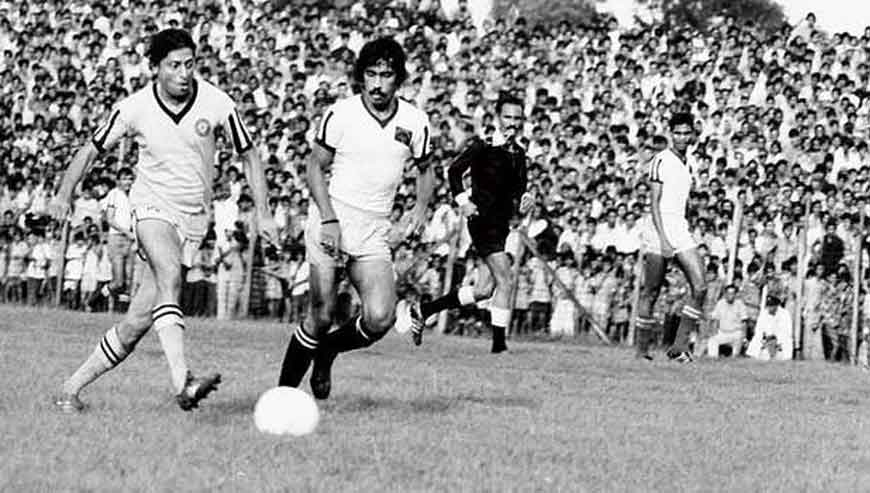Remembering Chuni Goswami on his birthday

The cruel year that was 2020 caused us several losses, among them one of Indian football's greatest legends. Born on January 15, 1938, Subimal 'Chuni' Goswami passed away last April. However, though it is birthday today, September is perhaps the month when we should be celebrating his life and career, because it was in September of 1962 that the Indian football team pulled off one of its most memorable feats, under the leadership of its young captain, a gift to Indian football from the Kolkata Maidan.
On September 4, 1962, Goswami led India to the men's football gold at the Asian Games in Jakarta, the capital of Indonesia. While this was laudable enough in itself, what made the victory particularly special were the tremendous odds against which it was staged, in a stadium packed with a hostile crowd of nearly 100,000, screaming their support for India's opponents, and taunting the Indian players at every step. And yet, Goswami and his men, among whom were a profusely bleeding Jarnail Singh, snatched victory on behalf of a country still recovering from the ravages of war. Alongside them fought such luminaries as Tulsidas Balaram, PK Banerjee, and Peter Thangaraj.
On September 4, 1962, Goswami led India to the men's football gold at the Asian Games in Jakarta, the capital of Indonesia. While this was laudable enough in itself, what made the victory particularly special were the tremendous odds against which it was staged, in a stadium packed with a hostile crowd of nearly 100,000, screaming their support for India's opponents, and taunting the Indian players at every step.
Their golden run had the potential to become as much of a milestone as the other great event in Indian sporting history, the cricket World Cup victory of 1983. Had Jakarta 1962 been wrapped in the right packaging, football could perhaps have become India's preeminent sport instead of cricket, despite Lord's 1983.
The build-up had been ominous. Almost from the outset, the Indian contingent in Jakarta had become an object of public derision and anger, but the reason had nothing to do with sports. On the eve of the Games, host nation Indonesia had decided to prevent Israel and Taiwan's participation, bowing to pressure from Saudi Arabia and China, respectively. Protesting the decision, G.D. Sondhi, representing India at the Jakarta Asian Games Federation Congress, had declared that both Israel and Taiwan were acknowledged by both the International Olympic Committee and Asian Games Federation, and that Indonesia had no right to exclude them from the Games.

The effect of his statement was instantaneous, with the whole of Indonesia exploding in fury at Sondhi's 'audacity'. Even President Sukarno (who had once been rescued by young Indian Air Force pilot and later Odisha Chief Minister Biju Patnaik under Jawaharlal Nehru's orders) issued a statement condemning India. Beginning their campaign under these circumstances, India lost their opening game against Asian Cup winners South Korea by two goals, prompting a wave of celebrations across Indonesia.
In their next group encounter, however, India got the better of Thailand with an emphatic 4-1 win, captain Chuni himself scoring the first goal. Midway through the match, Jarnail Singh left the field with six stitches in his head. And in their third match, against the mighty Japanese, PK Banerjee, Ram Bahadur, and Balaram came out all guns blazing as India wrested a two-goal victory.
Up against South Vietnam in the semifinal, India surrendered a two-goal lead as their opponents scored twice in the second half. After a breathless 75 minutes, Chuni Goswami's blistering shot found the net, and India had a place in the final, against South Korea.
 Inevitably, success on the field attracted even more fury off it. Out on the streets, even in hotels and restaurants, members of the Indian contingent were the objects of angry taunts and complete non-cooperation from locals. Matters reached a point where the Indian embassy was vandalised a day ahead of the final, its furniture ransacked and glass panes shattered. To top it all, Sondhi was actually receiving death threats.
Inevitably, success on the field attracted even more fury off it. Out on the streets, even in hotels and restaurants, members of the Indian contingent were the objects of angry taunts and complete non-cooperation from locals. Matters reached a point where the Indian embassy was vandalised a day ahead of the final, its furniture ransacked and glass panes shattered. To top it all, Sondhi was actually receiving death threats.
On September 4, as Goswami and his boys made their way to the stadium from the Games Village, the Indian team banner was taken off the bus for security reasons. Obviously identifiable as an Indian Sikh owing to his turban, Jarnail was asked to squat on the floor of the bus. This ignominy was compounded by the insult and abuse flying at them from all directions as they walked out to the pitch. Not even the Indian national anthem was spared, the crowd booing as it played.
At the centre of this seething cauldron, the legendary team coach Syed Abdul Rahim was an ocean of calm. Before they took the field, Rahim sahab made the boys sing patriotic songs, holding hands to form a fearless human chain. At the other end of the field stood the best team in Asia, reigning Asian Cup champions, and the same team that had defeated India in the semifinals of the 1958 Games.
No handsome rewards awaited them back home, no endorsement offers, no government jobs, and yet, Jarnail Singh of Punjab, PK Banerjee of Bengal, Tulsidas Balaram from Andhra Pradesh, Peter Thangaraj of Hyderabad, Chandrasekhar of Bombay, and Ram Bahadur of Dehra Dun stood shoulder to shoulder with their captain. Around them, the raging firestorm of public fury made even the referee's whistle impossible to hear at times. Even so, PK and Jarnail put India well and truly in the driver's seat, with South Korea managing just a single goal, in the dying moments of the match.
The game may have ended with the final whistle, but the drama didn't. As blood poured freely from Jarnail's reopened wounds, and tears flowed down Rahim sahab's cheeks, the still furious crowd compelled the Indian team to cut short their celebrations and practically sneak out of the stadium in an unlit bus, leaving Jakarta as soon as they could, almost like criminals.
This football fairytale could have, should have, changed the fortunes of Indian football forever. Fresh from its defeat in the 1962 Indochina War, India could have found a new set of heroes, fired new hopes. Instead, before their passing, those same heroes were witness to Japan and South Korea's meteoric rise through the ranks of global football, right up to the World Cup, while in their own country, their beloved sport still fights a daily battle for survival.
With inputs from Somen Sengupta









